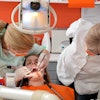
Editor's note: This article first appeared on the website Dental Intelligence on May 8, 2012. Reprinted with permission of William T. Brown, DDS.
 William T. Brown, DDS
William T. Brown, DDS
The message on the front door of a restaurant in Austin, Texas, reads:
"If we don't meet your expectations, lower your expectations."
I thought about my dental practice when I read the notice. Do we meet our client's expectations? Do they need to lower their expectations after they visit?
What are their expectations? How does our office meet or surpass their expectations?
An emergency patient, new to our practice, made me realize I might need to put the above notice on the front door of our state-of-the-art office.
The patient was a self-made, successful contractor/developer. He fractured the two front false teeth on his "flipper" partial. It was early Monday morning and he had a busy week scheduled. But now he had to deal with teeth that affected more than his mouth.
The "flipper" had been delivered 15 years ago as a temporary. To him it was perfectly serviceable, until he bit into a chop bone. I thought of telling him all dental restorations were temporary; some more temporary than others.
His expectation was to get the thing fixed "yesterday." My expectation was a four-unit fixed prosthesis.
I went into elaborate explanation about how wonderful a new bridge would be. I didn't notice how exasperated he was becoming. He was double-parked and his engine was revved. Instead of doing a quickie repair and rescheduling the hard-charging man, I was telling him how I was going to fix his teeth.
To him, he asked for the time of day and I was telling him how to make a watch.
He finally shook his head, took off the napkin chained around his neck and left without a goodbye.
I was confused. What had I done to offend him? I thought I was doing him a favor.
My staff explained to me that I hadn't met his expectations. They were correct; I hadn't.
That was the day I began giving serious thought to expectations.
What were my expectations?
He expected me to fix his front teeth [pretty damn quick]. I didn't and he left.
I realized I should have taken care of his chief concern as quickly as possible, told him the "Spackle" repair would fail in the near future and reappointed him. It wasn't a money issue for the patient. It was an expectation issue.
At a subsequent appointment, I could have established a doctor-patient relationship, mutually agreed on our goals for him, and completed a collaborative exam to involve him in his dental health story. And, without sales techniques, we could have proceeded with treatment on his time frame.
Unfortunately, I appeared to him as someone trying to up-sell him instead of taking care of his problem.
I viewed the contractor as a talisman for my future practice. It was a touchstone for how and what I needed to accomplish so that our practice could meet and exceed patient expectations.
Was I to continue to ask patients to lower their expectations when they weren't met or to establish systems that surpassed them? If you don't know where you're going, any road will get you there.
The contractor with a broken flipper prompted me to create a statement of my practice expectations that was communicable and demonstrable to patients and staff. That step was essential in establishing a well-trained team, which was long-term and committed, with a sense of proprietorship and community.
The consequence raised our expectations so clients didn't need to lower theirs.
William T. Brown, DDS, practices in Des Moines, IA. He started his blog, Dental Intelligence, in 2010 to share information and experiences that have fundamentally changed the way dentistry is practiced.



















